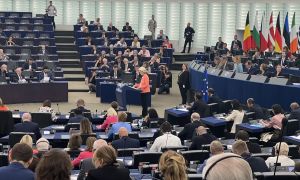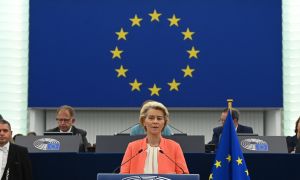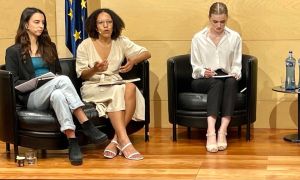On Wednesday, 13 September, we attended the headquarters of the European institutions in Barcelona to follow the speech on the state of the Union by the President of the European Commission, Ursula Von der Leyen, in front of the European Parliament in Strasbourg.
The speech opened the debate on the state of the Union in 2023 and this year was the last speech of this legislature, since in June 2024 the European elections will be held. Moreover, it was a particularly important speech, since in the last year Europeans have faced unprecedented challenges such as an energy crisis, the effects of the pandemic or the war in Ukraine, with the most massive displacement of refugees since World War II, and has boosted the economy with record European investments.
A situation that has led the European Union to respond with measures to support Ukraine and hold Russia accountable. In addition, investment inside and outside the Union has been boosted, in the field of the economy work has been done on accelerating green and digital transitions, and in the social field, fundamental EU values of equality, inclusiveness and social justice have been protected.
Debate with young pro-Europeans
Following the speech, the European Commission in Barcelona organised a debate with young people moderated by the writer and cultural journalist, Eudald Espluga, with the following participants:
- Ada Font, member of Young European Federalists of Catalonia.
- Viviane Ogou, President of Puerta de África and delegate of the Barcelona Youth Council at the Caucus Jove.
- Maria Serra, ambassador of the European Climate Pact.
The axes of Ursula Von der Leyen’s speech
The President made a positive assessment of the last year and reviewed the main objectives of the European agenda.
On the Pact on Migration and Asylum, which the European Commission would like to approve in these 300 days that are missing mandate, he explained that it will be a tool for the fight against mafias and human trafficking, and to work with other countries on agreements similar to those signed with Tunisia to combat immigration.
"We have never been so close to the possibility of an agreement for a new Migration and Asylum Pact. We need new legislation that is more up-to-date, commensurate with current challenges, that guarantees more rights, greater governance and more prominence on the part of our agencies," said von der Leyen.
As regards the fight against climate change, he spoke of the European Green Pact which provides the framework, incentives and investment to move towards a greener, cleaner and more sustainable economy. " Four years ago, the European Green Pact was our response to the call of history. We will continue to promote renewable energy. The future of the clean technology industry must be a reality in Europe", said the president.
Von der Leyen has also defended, since the plenary session of the European Parliament, the need for the European Union to have a common standard that protects "the basic principle that is not" with the aim of combating male violence. " There can be no true equality without ending violence against women. Europe has made a change in gender-based violence, but the work is not yet finished," he said. The President recalled that there has been historic progress in terms of gender equality, as evidenced by the EU’s historic accession to the Istanbul Convention, as well as the drive to adopt a European law to combat gender violence.
In his speech, he also talked about challenges related to the digital transition, such as the ethical and safe regulation of artificial intelligence. He called for Europe to play a leading role in creating a global framework to regulate artificial intelligence.
With regard to Ukraine and the enlargement of the EU, he recalled that four million Ukrainians remain in the European Union and announced that they will be extended protection by the Union. He explained that EUR 12 billion of aid has already been allocated to Ukraine this year alone and that he expects another EUR 50 billion to be allocated in the coming years.
He also pointed out what will be the main challenge for the coming years: the enlargement of the European Union. Since the war in Ukraine, there has been more willingness to speed up this enlargement with Ukraine, the Balkan countries (Serbia, Montenegro, Bosnia and Herzegovina, North Macedonia, Albania, Kosovo), but also with Georgia and Moldova. In this sense, he assured without setting a date that the European Union will have more than 30 members and more than 500 million people under the umbrella of respect for human rights and the rule of law. "
"In 2024 it will be 20 years since the enlargement of the EU. We must continue to move in this direction, favouring the accession of more countries and deepening greater integration. Only in this way will we ensure a European Union with a more decisive geopolitical role", concluded the President of the European Commission.
What is SOTEO and why is it important?
Every year in September, the President of the European Commission addresses the State of The European (SOTEU) (State of the European Union) to the European Parliament, taking stock of the achievements and presenting the priorities for the following year.
This is a historic annual event set up by the Treaty of Lisbon in 2010 to make the Union’s political life more democratic and transparent. It is the starting gun of the "Government of Europe" for the new year, a kind of beginning of the political course. It should be borne in mind that the President’s announcements have an impact on the lives, rights and freedoms of European citizens.














